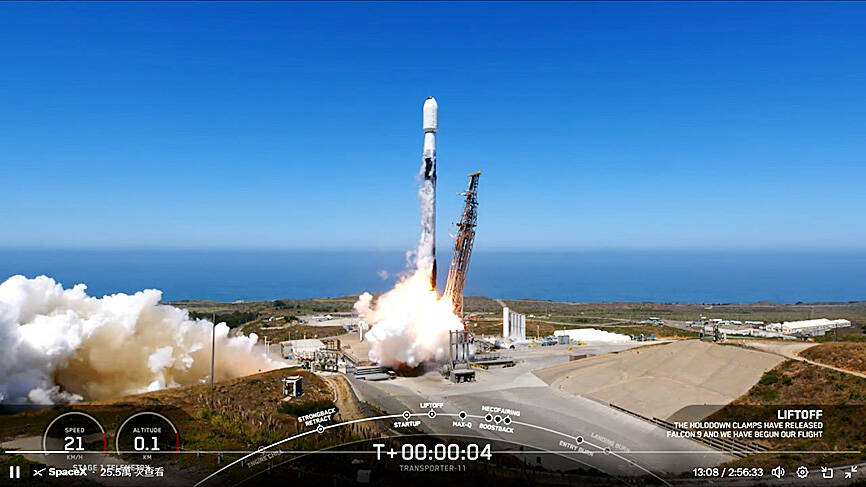A Space Exploration Technologies Corp (SpaceX) Falcon 9 rocket on Friday carried two Taiwan-developed satellites into orbit, along with 114 others, the Taiwan Space Agency (TASA) said.
The two “cube satellites” or CubeSats — Toro and Nightjar — were launched into space at 11:56am from Space Launch Complex 4E at Vandenberg Space Force Base in California on the Transporter-11 rideshare mission, TASA said.
Toro and Nightjar entered orbit at about 2:30pm, the agency said.

Photo: Screen grab from livestream via the Taiwan Space Agency
CubeSats are a class of small satellites made up of multiple cubic modules each measuring 10cm on a side and weighing up to 1.3kg that have a wide range of applications and are increasingly relevant in the aerospace industry.
Toro and Nightjar are both 30cm by 10cm by 10cm, TASA said.
Compared with traditional satellites, the CubeSats business has a relatively low entry threshold in terms of cost and technology. As they are smaller and lighter, a rocket is able to carry many CubeSats at the same time, making them a good option for those in the private sector wanting to enter the aerospace industry.
Toro, which was developed by satellite communications product supplier Pyras Technology Inc (芳興科技), carries a payload of cameras that are to photograph the ocean over four hot spots in the equatorial region to analyze changes in the water’s color and enable the completion of fishing ground positioning, TASA said.
Thanks to Toro, Taiwan’s aerospace technologies are expected to serve the country’s fishing industry well, using positioning technologies, marine communications and fleet management, as Pyras Technology has worked hard conducting field surveys in oceans to meet market needs, the agency said.
Toro is expected to help the fishing industry find ocean resources, it added.
Pyras Technology has been working on developing satellites, such as Formosat-1, with TASA since the 1990s, when it was called the National Space Organization, the agency said.
Pyras Technology has also worked with foreign space and military organizations to develop satellite components, TASA said.
Nightjar, developed by antenna designer and radio frequency testing manufacturer Rapidtek Technologies Inc (鐳洋科技), carries a payload of Ku-band high-speed Internet of Things communications services, and its mission is to test communication links between satellites and fixed user terminals or high-speed moving user terminals on the ground, TASA said.
If the two CubeSats work well and get certified, it would open the door for Taiwan to develop satellite engineering and compete in the commercial aerospace industry, it said.
TASA in 2022 launched a 10-year satellite innovation program focusing on the development of CubeSats. The program has four phases. Pyras Technology and Rapidtek Technologies are part of the second phase of three years, which started last year. The first phase was a one-year preparation phase. The third and fourth phases are to last three years each.
The two companies and Tron Future Tech Inc (創未來科技), which provides active electronically scanned array technologies for communications equipment, are developing larger CubeSats that are 40cm by 20cm by 20cm.
The launch of the first of these CubeSats is scheduled for next year, TASA said.

CHAOS: Iranians took to the streets playing celebratory music after reports of Khamenei’s death on Saturday, while mourners also gathered in Tehran yesterday Iranian Supreme Leader Ayatollah Ali Khamenei was killed in a major attack on Iran launched by Israel and the US, throwing the future of the Islamic republic into doubt and raising the risk of regional instability. Iranian state television and the state-run IRNA news agency announced the 86-year-old’s death early yesterday. US President Donald Trump said it gave Iranians their “greatest chance” to “take back” their country. The announcements came after a joint US and Israeli aerial bombardment that targeted Iranian military and governmental sites. Trump said the “heavy and pinpoint bombing” would continue through the week or as long

TRUST: The KMT said it respected the US’ timing and considerations, and hoped it would continue to honor its commitments to helping Taiwan bolster its defenses and deterrence US President Donald Trump is delaying a multibillion-dollar arms sale to Taiwan to ensure his visit to Beijing is successful, a New York Times report said. The weapons sales package has stalled in the US Department of State, the report said, citing US officials it did not identify. The White House has told agencies not to push forward ahead of Trump’s meeting with Chinese President Xi Jinping (習近平), it said. The two last month held a phone call to discuss trade and geopolitical flashpoints ahead of the summit. Xi raised the Taiwan issue and urged the US to handle arms sales to

BIG SPENDERS: Foreign investors bought the most Taiwan equities since 2005, signaling confidence that an AI boom would continue to benefit chipmakers Taiwan Semiconductor Manufacturing Co’s (TSMC, 台積電) market capitalization swelled to US$2 trillion for the first time following a 4.25 percent rally in its American depositary receipts (ADR) overnight, putting the world’s biggest contract chipmaker sixth on the list of the world’s biggest companies by market capitalization, just behind Amazon.com Inc. The site CompaniesMarketcap.com ranked TSMC ahead of Saudi Aramco and Meta Platforms Inc. The Taiwanese company’s ADRs on Tuesday surged to US$385.75 on the New York Stock Exchange, as strong demand for artificial intelligence (AI) applications led to chip supply constraints and boost revenue growth to record-breaking levels. Each TSMC ADR represents

Pro-democracy media tycoon Jimmy Lai’s (黎智英) fraud conviction and prison sentence were yesterday overturned by a Hong Kong court, in a surprise legal decision that comes soon after Lai was jailed for 20 years on a separate national security charge. Judges Jeremy Poon (潘兆初), Anthea Pang (彭寶琴) and Derek Pang (彭偉昌) said in the judgement that they allowed the appeal from Lai, and another defendant in the case, to proceed, as a lower court judge had “erred.” “The Court of Appeal gave them leave to appeal against their conviction, allowed their appeals, quashed the convictions and set aside the sentences,” the judges